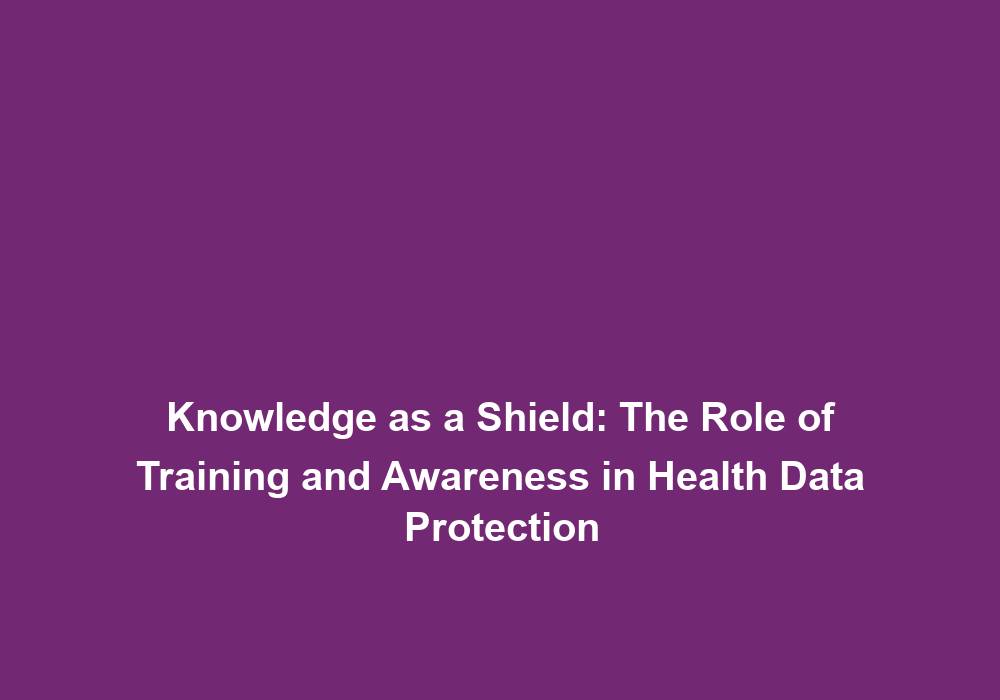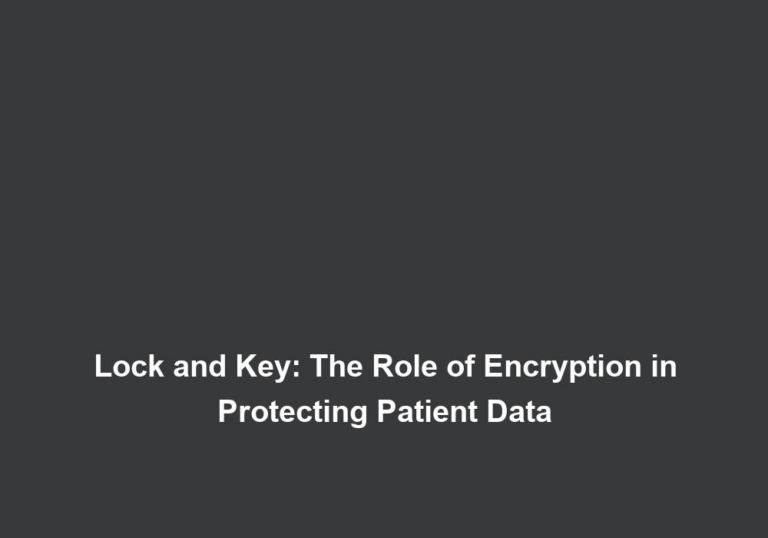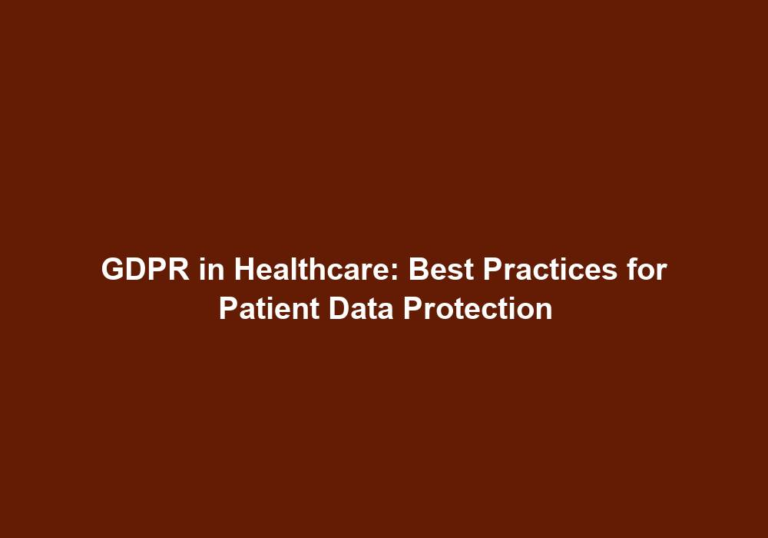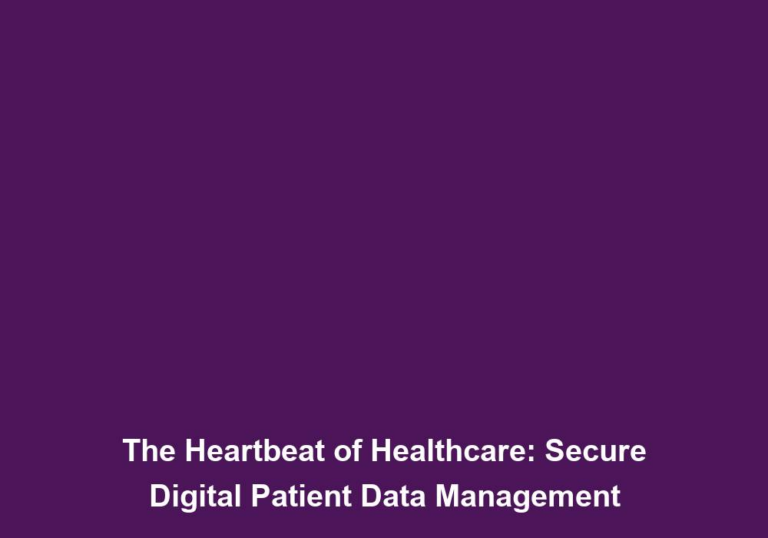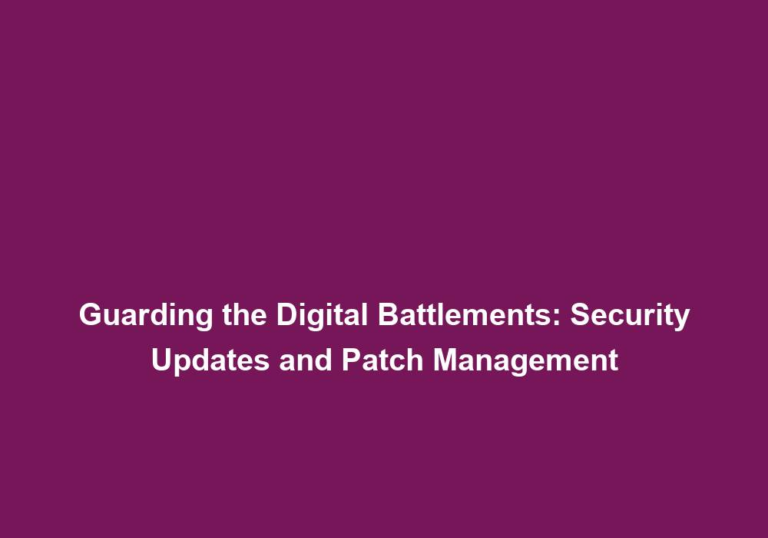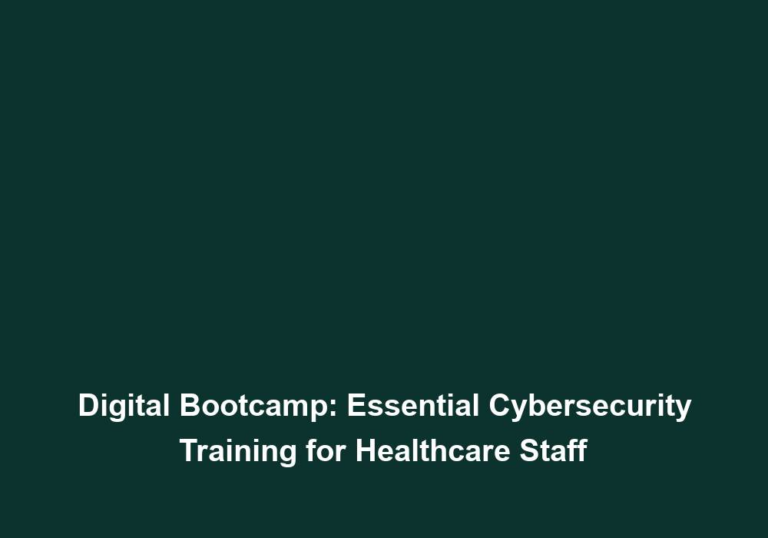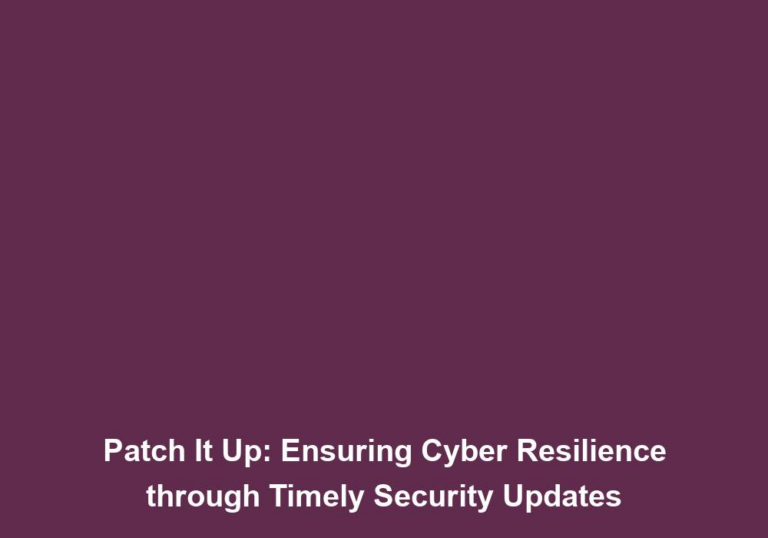Empowering the Frontline: Training and Awareness in Healthcare Cybersecurity
In today’s digital age, the healthcare industry is increasingly relying on technology to improve patient care and streamline operations. However, this increased reliance on technology also exposes healthcare organizations to the risk of cybersecurity threats. To ensure the security and integrity of patient data, it is crucial to empower frontline healthcare professionals with the necessary training and awareness in cybersecurity.
The Importance of Cybersecurity in Healthcare
Healthcare organizations handle vast amounts of sensitive patient data, including personal information, medical records, and insurance details. This makes them an attractive target for cybercriminals seeking to exploit vulnerabilities and steal this valuable information. The consequences of a successful cyber attack on a healthcare organization can be devastating, not only in terms of financial losses but also the potential harm to patients.
Cybersecurity in healthcare is essential for several reasons:
-
Patient Privacy: Protecting patient data is a crucial ethical and legal responsibility for healthcare organizations. Breaches of patient privacy can lead to significant consequences, including reputational damage and legal penalties. By implementing robust cybersecurity measures, healthcare organizations can ensure the confidentiality and integrity of patient information.
-
Operational Continuity: Cyber attacks can disrupt healthcare operations, leading to delays in patient care and potentially compromising patient safety. By investing in cybersecurity training and awareness, frontline healthcare professionals can minimize the risk of cyber attacks and maintain operational continuity.
-
Regulatory Compliance: Healthcare organizations must comply with various data protection regulations, such as the Health Insurance Portability and Accountability Act (HIPAA). Failure to comply with these regulations can result in severe penalties. By empowering frontline professionals with cybersecurity knowledge, organizations can ensure compliance and avoid legal issues.
Understanding the Frontline
The frontline of healthcare refers to the individuals who directly interact with patients, such as doctors, nurses, and administrative staff. These frontline professionals play a crucial role in ensuring the security of patient data as they are often the first point of contact with technology systems. However, they are also susceptible to unknowingly becoming the weak link in the cybersecurity chain if they are not adequately trained and aware of potential threats.
Frontline healthcare professionals need to understand the following:
-
Cybersecurity Risks: Frontline professionals should be educated about the various cybersecurity risks they may encounter, such as phishing attacks, malware infections, and social engineering. By understanding these risks, they can be more vigilant and take appropriate actions to prevent security breaches.
-
Importance of Compliance: Frontline professionals should be aware of the legal and regulatory requirements related to patient data protection. This includes understanding the specific regulations that apply to their role, such as HIPAA. By understanding these requirements, they can ensure that their actions align with the necessary compliance standards.
-
Role in Security Incident Response: Frontline professionals should understand their role in identifying and reporting security incidents promptly. This includes recognizing signs of a potential cyber attack, such as unusual system behavior, unexpected pop-ups, or unauthorized access attempts. By reporting incidents promptly, they can help mitigate the impact of cyber attacks.
Training Frontline Healthcare Professionals
-
Cybersecurity Basics: Frontline healthcare professionals should receive training on the fundamental concepts of cybersecurity. This should include topics such as the importance of strong passwords, recognizing phishing attempts, and safe internet browsing practices. By reinforcing these basics regularly, healthcare organizations can promote good cybersecurity habits.
-
Identifying and Reporting Security Incidents: Training frontline professionals to identify and report any suspicious activity or security incidents is crucial. This includes educating them about the signs of a potential cyber attack, such as unusual system behavior, unexpected pop-ups, or unauthorized access attempts. By empowering frontline professionals to take prompt action, healthcare organizations can minimize the impact of security incidents.
-
Data Protection and Privacy: Healthcare professionals should understand the importance of protecting patient data and maintaining privacy. Training should cover topics such as data encryption, secure file sharing methods, and the appropriate use of personal devices when accessing sensitive information. By emphasizing data protection and privacy, healthcare organizations can ensure the confidentiality and integrity of patient data.
-
Social Engineering Awareness: Social engineering attacks, such as phishing, are common in the healthcare industry. Frontline professionals should be educated on how to identify and avoid falling victim to these tactics. This includes being cautious of suspicious emails, avoiding clicking on unknown links, and verifying the authenticity of requests for sensitive information. By raising awareness about social engineering, healthcare organizations can reduce the risk of successful attacks.
Incorporating Awareness Programs
In addition to training, healthcare organizations should implement ongoing cybersecurity awareness programs to keep frontline professionals updated on the latest threats and best practices. These programs can include the following:
-
Regular Security Awareness Sessions: Conducting regular security awareness sessions led by IT security experts is essential. These sessions can cover topics such as emerging cybersecurity threats, common attack vectors, and best practices for maintaining a secure digital environment. By providing up-to-date information, healthcare organizations can ensure frontline professionals stay informed about the evolving cybersecurity landscape.
-
Simulated Phishing Exercises: Healthcare organizations can conduct simulated phishing exercises to test frontline professionals’ ability to identify and respond appropriately to phishing attempts. These exercises help raise awareness and reinforce the importance of vigilant behavior. By simulating real-world scenarios, organizations can train frontline professionals to detect and avoid phishing attacks effectively.
-
Internal Communication Channels: Establishing internal communication channels, such as newsletters or intranet portals, can serve as a platform to share cybersecurity-related updates, tips, and reminders. This helps keep frontline professionals engaged and informed about the evolving cybersecurity landscape. By fostering communication, healthcare organizations can create a collaborative environment where frontline professionals can actively participate in cybersecurity initiatives.
-
Reward and Recognition Programs: Recognizing and rewarding frontline professionals who demonstrate exemplary cybersecurity practices can incentivize others to follow suit. This can be done through certificates, badges, or other forms of recognition within the healthcare organization. By acknowledging and appreciating their efforts, healthcare organizations can reinforce a culture of cybersecurity and encourage continuous improvement.
Collaboration with IT and Security Teams
To empower frontline professionals effectively, collaboration between IT and security teams and the frontline staff is essential. This collaboration can be fostered through the following initiatives:
-
Regular Communication Channels: Establishing open lines of communication between frontline professionals and IT/security teams allows frontline professionals to report any potential security issues or seek guidance when faced with suspicious activities. By encouraging communication, healthcare organizations can facilitate the timely detection and response to security incidents.
-
Feedback and Suggestions: Encourage frontline professionals to provide feedback and suggestions regarding cybersecurity measures and training programs. Their firsthand experiences can contribute valuable insights to enhance the overall security posture of the healthcare organization. By actively seeking input from frontline professionals, healthcare organizations can continuously improve their cybersecurity initiatives.
-
Tailored Training Programs: Collaborate with IT and security teams to develop training programs specifically designed to address the unique challenges faced by frontline healthcare professionals. This ensures that the training is relevant, relatable, and useful in their day-to-day work. By tailoring training programs, healthcare organizations can maximize the effectiveness of cybersecurity education for frontline professionals.
The Benefits of Empowering the Frontline
Empowering frontline healthcare professionals with adequate cybersecurity training and awareness offers several benefits:
-
Improved Security Posture: Well-trained frontline professionals are better equipped to identify and respond to potential cybersecurity threats, reducing the risk of successful attacks. By empowering the frontline, healthcare organizations can strengthen their overall security posture.
-
Protecting Patient Data: By raising awareness about cybersecurity best practices, frontline professionals contribute to protecting the confidentiality and integrity of patient data. This helps maintain patient trust and ensures that sensitive information remains secure.
-
Compliance with Regulations: Healthcare organizations must comply with various data protection regulations, such as HIPAA. Empowering the frontline with cybersecurity knowledge helps ensure compliance and avoid potential penalties and legal issues. By complying with regulations, healthcare organizations demonstrate their commitment to safeguarding patient data.
-
Building a Culture of Security: By prioritizing cybersecurity and involving frontline professionals, a culture of security is fostered throughout the healthcare organization. This culture encourages everyone to take responsibility for maintaining a secure environment. By building a culture of security, healthcare organizations create a collective effort to protect patient data and mitigate cybersecurity risks.
Conclusion
Empowering frontline healthcare professionals with robust cybersecurity training and awareness is vital for protecting patient data and ensuring the overall security of healthcare organizations. Through a combination of training programs, awareness initiatives, and collaboration with IT and security teams, organizations can build a strong frontline that is equipped to face the evolving cybersecurity landscape. By doing so, healthcare organizations can provide better care while safeguarding patient privacy and trust.

